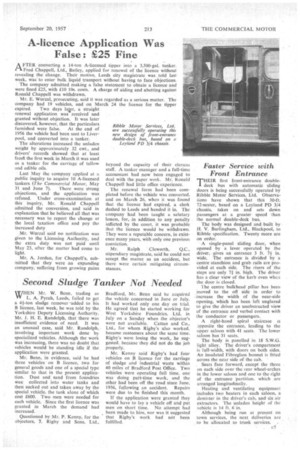A-licence Application Was False : £25 Fine
Page 45

If you've noticed an error in this article please click here to report it so we can fix it.
AFTER converting a 14-ton A-licensed tipper into a 3,500-gal. tanker. Fred Chappell, Ltd., Batley, applied for renewal of the licence without
revealing the change. Their motive, Leeds city magistrate was told last week, was to enter bulk liquid transport without having to face objections.
The company admitted making a false statement to obtain a licence and were fined £25, with £10 10s. costs. A charge of aiding and abetting against Ronald Chappell was withdrawn.
Mr. E. Wurzal, prosecuting, said it was regarded as a serious matter. The company had 19 vehicles, and on March 24 the licence for the tipper expired. Two days laser, a straight renewal application was received and granted without objection. It was later discovered, however, that the particulars furnished were false. At the end of 1956 the vehicle had been sent to Liverpool, and converted into a tanker.
The alterations increased the unladen weight by approximately 32 cwt., and drivers' records showed that at least froni the first week in March it was used as a tanker for the carriage of tallow and edible oils.
Last May the company applied at a public inquiry to acquire 10 A-licensed tankers (The Commercial Motor, May 31 and June 7). There were strong objections, and the application was refused. Under cross-examination at this inquiry, Mr. Ronald Chappell admitted the conversion, and said in explanation that be believed all that was necessary was to report the change at the local taxation office and pay the increased duty.
Mr. Wurzal said no notification was given to the Licensing Authority, and the extra duty was not paid until May 23, after the matter had come to light.
Mr. A. Jordan, for Chappell's, submitted that they were an expanding company, suffering from growing pains beyond the capacity of their clericai staff. A tanker manager and a full-time accountant had now been engaged to deal with the paper work. Mr. Ronald Chappell had little office experience.
The renewal form had been completed before the vehicle was converted, and on March 26, when it was found that the licence had expired, a clerk dashed to Leeds and handed it in. The company had been taught a salutary lesson, for, in addition to any penalty inflicted by the court, it was probable that the licence would be withdrawn. They were a reputable concern, in existence many years, with only one previous conviction.
Mr. Ralph Cleworth, Q.C., stipendiary magistrate, said he could not accept the matter as an accident, but there were certain mitigating circumstances.
















































































































